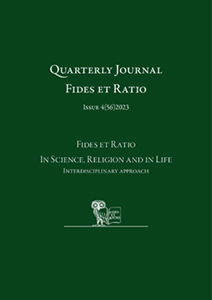Abstract
The article presents some of Augustine’s assumptions about church music. Nowadays, his thoughts related to music contained in his philosophical works are widely known and studied. This paper, however, concentrates mainly on his homiletic speeches and speeches delivered on special occasions in which Augustine taught about the Church. In his speeches, Augustine portrayed music as an external sign of the unity and universality of the Church, which were taken care of in the ancient community. The music performed during the Church’s liturgy also became a good example for polemics with pagans and heretics. In Augustine’s opinion, music also supports eschatology well, as it pictures future events in which the worship of God through music will have no end. Many of Augustine’s thoughts referring to the Church and music have been preserved, however the work is limited to only a few of the more interesting examples. The results of the analysis can be compared with the contemporary teaching of the Church on sacred music, which emphasizes, for example, the active participation of the faithful in the liturgy, as well as internal activity–the source of these suggestions is embedded in the ancient Church and reminds us of those theses, among others, recorded in his works and preached by Saint Augustine of Hippo.
References
Bettetini, M. (1991). Stato della questione e bibliografia ragionata sul dialogo „De musica” di sant’Agostino (1940-1990). Rivista di Filosofia Neo-Scolastica, 83(3), 430-469.
Miśkiewicz, G. (2014). Grecki etos muzyczny i jego wpływ na kształtowanie się koncepcji śpiewu Kościoła w pierwszych wiekach chrześcijaństwa. Lublin: Polihymnia.
Günther, J. (2019). Musik als Argument spätantiker Kirchenväter. Untersuchungen zu Laktanz, Euseb, Chrysostomos und Augustinus. Wiesbaden: Harrassowitz Verlag.
Karpowicz-Zbińkowska, A. (2021). Rozbite zwierciadło. O muzyce w czasach ponowoczesnych. Kraków: Wydawnictwo Benedyktynów.
Malec, M. (2023). Muzyka w liturgii sakramentu małżeństwa. Teoria, praktyka i perspektywa. Kraków: Wydawnictwo Naukowe Akapit.
Micunco, G. (2011). Canto chi ama. La musica e il canto in sant’Agostino. Madugno: Stilo Editrice.
Pius X, (2002). Motu proprio papieża Piusa X o muzyce i śpiewie kościelnym. Warszawa: Wydawnictwo Tradycji Katolickiej.
Ratzinger, J. (2014). Lud i Dom Boży w nauce św. Augustyna o Kościele. (In:) K. Góźdź, M. Górecka (eds.), Opera Omnia Josepha Ratzingera, t. 1. Lublin: Wydawnictwo KUL.
Sobór Watykański II, (2002). Konstytucje, dekrety, deklaracje.Poznań: Wydawnictwo Pallottinum.
Stankiewicz, D. (2014). Musica sacra w służbie personae sanctae. (In): J. Bramorski (ed.), Muzyka sakralna wobec współczesnych wyzwań kulturowych, 32-48. Gdańsk: Wydawnictwo Akademii Muzycznej im. Stanisława Moniuszki w Gdańsku.
Święta Kongregacja Obrzędów, (2011). Instrukcja o muzyce w świętej liturgii Musicam Sacram. (In): A. Filaber (ed.), Prawodawstwo muzyki kościelnej, 43-59. Warszawa: Wydawnictwo Archidiecezji Warszawskiej : Centrum Duszpasterstwa Archidiecezji Warszawskiej.
Wuidar, L. (2014). La simbologia musicale nei Commenti ai salmi di Agostino. Milano: Mimesis.

